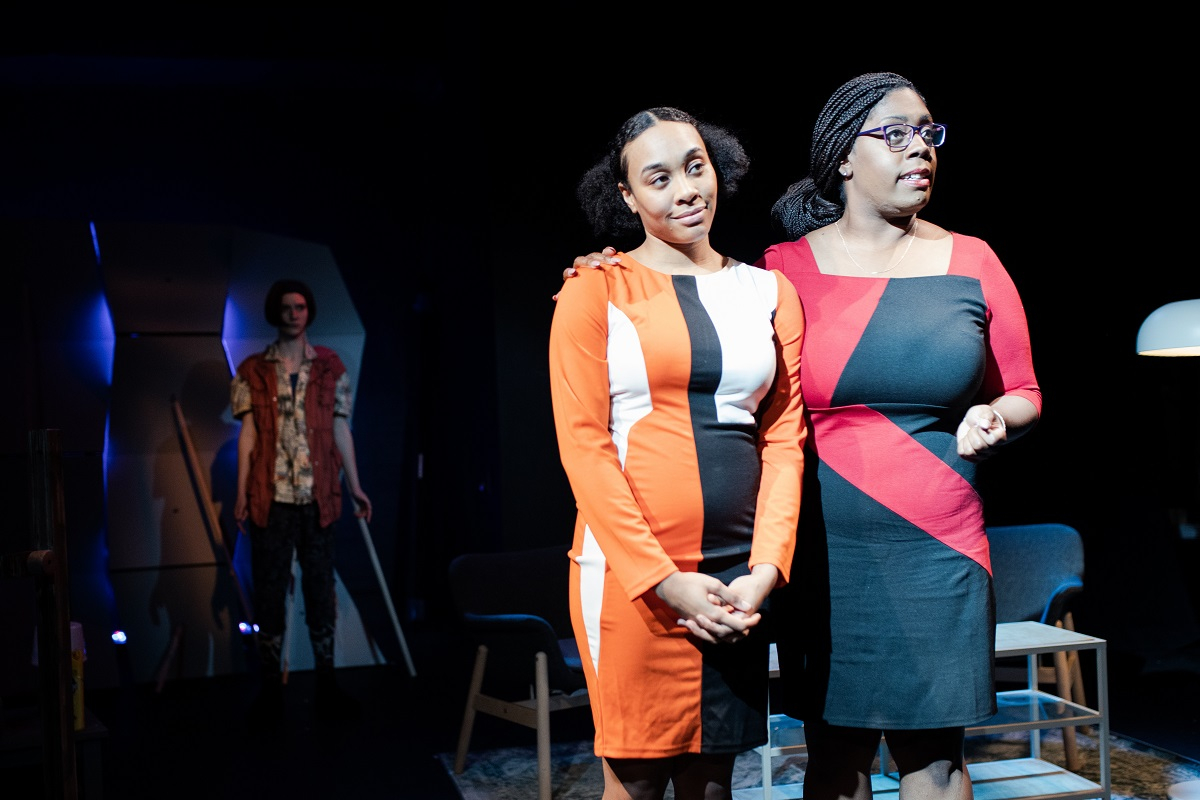
Really Really Gorgeous
Written by Nick Mecikalski
Directed by Miranda Haymon
Presented by The Tank in association with Lucy Powis and the Hodgepodge Group
at The Tank, NYC
January 23-February 9, 2020
In Nick Mecikalski's Really Really Gorgeous, the United States is really, really wet. And by wet, we mean that there remains a single oasis of dry land to which the government has relocated, along with some surviving citizens privileged enough to be permitted inside its walls. Mecikalski's play approaches this continent-spanning catastrophe from a personal perspective, focusing, with a healthy dash of absurdism, on a single couple within this watery new world order to examine the clash between principles and self-preservation in the face of environmental apocalypse.
When we meet protagonists Pen (Sophie Becker) and Mar (Amber Jaunai), the United States is into its fifth year of being flooded. The two of them, both poets, live in a shack where the television seems to be their primary connection to the outside world and where they subsist on deliveries of rations in whose composition they have no input. It tidily sums up their circumstances that the two women pine for the luxury of green beans. Meanwhile, it eventually becomes clear that the aggressively cheery (and sometimes just aggressive) Announcer (Giselle LeBleu Gant) dominates the television airwaves to the extent that she serves as a one-woman choke point of information. Early on, Becker and Jaunai effectively establish Pen and Mar's supportive and affectionate romantic relationship, and this foundation becomes quickly important when a government-sponsored talent contest that promises bring the winners to dry land threatens to drive a wedge between them (the name Mar, of course, has meanings other than "sea"). To say much more would be a disservice to the pleasures of watching this unpredictable production unfold.
Among other concerns, Really Really Gorgeous explores how authoritarianism works, including its attractiveness during times of crisis or insecurity. The play highlights how, in the right situation, something as simple as a dry room can take on a corrupting allure. If one replaced "climate change" with "totalitarian dictatorship," the mechanics would look much the same. The world that Pen and Mar find themselves caught up in foregrounds that destructive feedback loop of environmental and political problems, a cycle in which the media is at best tacitly complicit. At worst, media outlets actively abet an unsustainable and oppressive status quo, as The Announcer demonstrates in referring to the many on the wrong side of the wall with the usefully dehumanizing term "intruders" (some of this should sound familiar from current U.S. politics). The sharp division between the privileged few and the sopping, struggling masses is starkly reflected in the set design, by Crushed Red, as well: Pen and Mar's living space, centered on a tv and couch, strewn with garbage, and stacked with cans of SpaghettiOs, is juxtaposed with a bright, neat, and tasteful space, standing in for several dry locations, that resembles a display in a furniture showroom.
Right up until the production's final moments, it keeps just the right amount of ambiguity as to the characters' true plans and motivations, which ethical choices they will make, and just what exactly is up with that finger gun, an engaging uncertainty helped enormously by a great cast. The good-heartedness of Becker's Pen is bound up with an iron determination. Juanai (who was also excellent as Jesus in racist small-town American in last year's production of Mac Wellman's Sincerity Forever at The Flea) shows a Mar who is herself increasingly performing while also making it easy to, like Pen, give her the benefit of the doubt. And while Gant gets a lot of the funniest moments as The Announcer, she also effortlessly pivots on a dime from, for example, stereotypically exuberant tv host to ominously businesslike power player.
Really Really Gorgeous invests audience members in the fate of a relationship alongside the fate of the nation but also leaves them questioning the trade-offs involved in both. Its off-kilter dystopia mixes humor and authenticity. We can only hope that it is more timely than prophetic. - Leah Richards & John Ziegler
